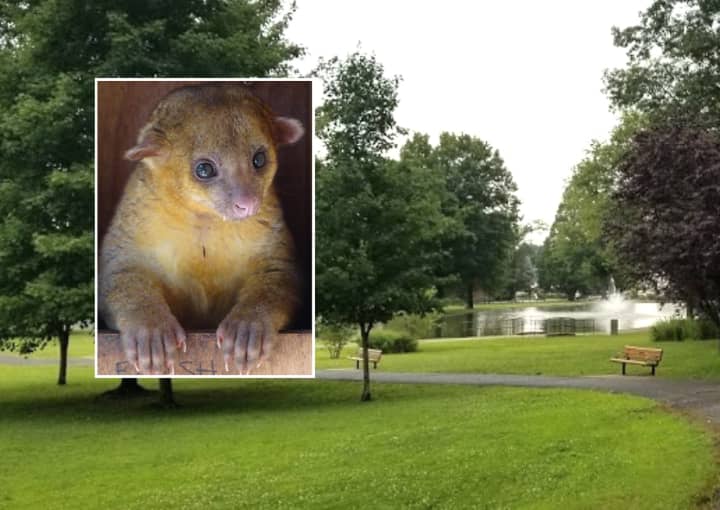The mom said her son was fishing and feeding the turtles at Samuel Nelkin County Park last week when he and her sister spotted the owner and his pet.
“They asked if it was friendly and the owner said yes,” she told Daily Voice. “My son gave the animal a quick pet and then my sister actually held the animal.
“When the animal was given back to the owner it started crawling all over him and then tried to go on his back and that’s when it bit my son. He wasn’t even touching it at all.”
Responding Wallington police officers summoned an ambulance. They also questioned the 51-year-old owner from Wood-Ridge before releasing him and the kinkajou.
“The animal was licensed and has all its papers,” Wallington Police Chief Carmello Imbruglia said.
The Bergen County Sheriff’s Office was following up, in consultation with the state Division of Fish and Wildlife.
The boy’s mother says the pet shouldn’t have moving freely in public. Her son had to get rabies shots at Hackensack University Medical Center and was scheduled for three more, plus antibiotics, she said.
He seemed OK but was “hurting and in pain,” she said.
Kinkajous -- also known as honey bears -- are tree-dwelling nocturnal mammals related to raccoons and small pandas.
Animal Defenders International says kinkajous are illegally captured in Central and South American rainforests and then sold in the U.S. and elsewhere, even though they're “completely unsuited to a life as a pet.”
Even Kinkatopia, a South Florida sanctuary dedicated to caring for unwanted "kinks," warns that bites are "not a matter of IF, but WHEN."
"Regardless of being captive bred, they will always ultimately be wild animals," says the non-profit's owner and operator, Alexandra Ashe. "[They] are not traditional pets by any means.
"The majority of them are going to succumb to an endless cycle of rehoming. It’s heartbreaking," Ashe added. "For over 99% of people, the most responsible decision is enjoying them from afar."
Local wildlife expert Joseph D’Angeli agreed.
“We have warned so many people that kinkajous don't make good pets,” said D’Angeli of the Wildlife Conservation and Education Center in Garfield. “We have spoken with New Jersey Fish and Wildlife and they were supposed to make them illegal.
"But it never happened.”
Kinkajous are high energy and high maintenance, he noted. Although ordinarily friendly, they're easily startled.
“They fall into the category of animals that can only be described as completely unpredictable and undeniably aggressive at some point,” D’Angeli said.
“I know everybody who has owned one has gotten bitten,” he added. “ I also know somebody that was seriously hospitalized because she contracted a blood disorder after getting bitten.
“But [the sellers] don’t care. They only care about the money.”
Click here to follow Daily Voice Atlantic and receive free news updates.


